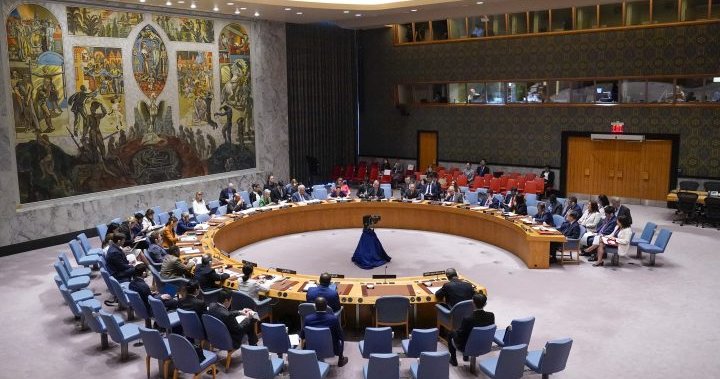The U.N. Security Council has requested the secretary-general to propose effective strategies for addressing the issue of armed gangs in Haiti. These options may include deploying a U.N. peacekeeping force or a non-U.N. multinational force. In a unanimous resolution, the council has directed U.N. Secretary-General Antonio Guterres to present a comprehensive range of options within 30 days. The aim is to improve the security situation by offering additional training to the Haitian National Police and supporting efforts to combat illegal arms trafficking in the impoverished country.
The resolution also grants authorization for up to 70 U.N. police and corrections advisers to increase their support and training for Haiti’s understaffed and underfunded national police force. Furthermore, it encourages countries, particularly those in the Caribbean region, to respond to the appeals made by Haiti’s prime minister and Secretary-General Guterres for the deployment of a specialized international force.
Last October, Haiti’s Prime Minister Ariel Henry urgently requested the immediate deployment of a specialized armed force to suppress the gangs. However, despite more than eight months passing since the appeal was made, no country has volunteered to lead such a force. During his visit to Haiti earlier this month, Secretary-General Guterres emphasized the need for a robust international force to assist the Haitian National Police in neutralizing and dismantling the gangs.
According to U.N. independent expert William O’Neill, who recently visited Haiti, the estimate that an additional 2,000 anti-gang police officers are required is not an exaggeration. O’Neill, an American lawyer with over 30 years of experience in Haiti and involvement in establishing the Haitian National Police in 1995, highlights the urgent need for reinforcements.
The power of the gangs has grown significantly since the assassination of President Jovenel Moïse on July 7, 2021. It is now estimated that they control up to 80% of the capital and have led to a surge in violent crimes, including killings, rapes, and kidnappings. This situation has provoked a violent response from civilian vigilante groups.
The challenge of gang warfare is further compounded by Haiti’s ongoing political crisis. Following the expiration of the terms of the country’s remaining 10 senators in early January, Haiti has been left without any democratically elected institutions.
The resolution, co-sponsored by the United States and Ecuador, strongly urges all countries to prohibit the supply, sale, or transfer of weapons to individuals involved in supporting gang violence and criminal activities.
Additionally, the resolution emphasizes the importance of the Haitian people, supported by the U.N. political mission known as BINUH, leading and owning the political process to organize free, fair, and credible legislative and presidential elections. It calls on Haitians to urgently reach an agreement on a sustainable and time-bound roadmap for elections.
BINUH’s mandate has been extended until July 15, 2024, and the resolution encourages the mission to explore options for strengthening Haiti’s criminal justice sector to combat impunity.
U.S. Ambassador Linda Thomas-Greenfield describes the resolution as a significant step towards assisting the Haitian people in shaping their future and restoring democratic order. However, she emphasizes the need for further action and calls on all 15 council members to collaborate with BINUH, the Haitian government, and the international community to help secure a more just and peaceful future for Haiti.
China’s deputy U.N. ambassador, Geng Shuang, reiterates the urgent need to stabilize the security situation and prevent the flow of arms in Haiti. He believes that without addressing these immediate challenges, any support for the Haitian National Police will be ineffective. Geng also emphasizes the importance of learning from past experiences and implementing long-term solutions that will truly benefit Haiti and help it emerge from the crisis.
In conclusion, the U.N. Security Council recognizes the severity of Haiti’s security crisis and has called for concrete actions to combat armed gangs. The resolution focuses on strengthening the Haitian National Police, addressing illegal arms trafficking, and considering the deployment of international forces. The council emphasizes the need for a Haitian-led political process and urges all countries to cease weapons supply to individuals involved in gang violence. It also extends the mandate of BINUH and encourages efforts to enhance Haiti’s criminal justice sector. The U.S. ambassador emphasizes the importance of collective action, while China’s deputy ambassador emphasizes the need for stability and long-term solutions.
Denial of responsibility! VigourTimes is an automatic aggregator of Global media. In each content, the hyperlink to the primary source is specified. All trademarks belong to their rightful owners, and all materials to their authors. For any complaint, please reach us at – [email protected]. We will take necessary action within 24 hours.


